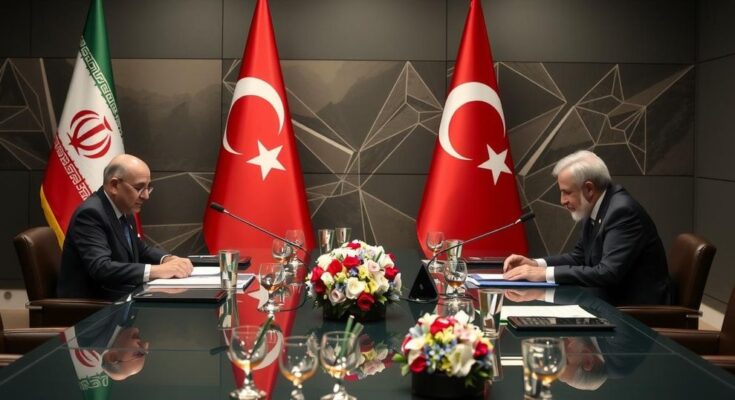Iran’s Foreign Minister Abbas Araghchi met with Turkish and Egyptian counterparts at the D-8 Economic Cooperation summit, marking a significant effort to strengthen economic ties. These discussions reflect Iran’s strategy to ally with non-Western nations, as seen through its engagement with groups such as BRICS and the SCO. Additionally, Iran’s President Pezeshkian’s attendance underscores the importance of these diplomatic relations, particularly with Pakistan.
Iran’s Foreign Minister, Abbas Araghchi, engaged in discussions with his Turkish counterpart Hakan Fidan and Egypt’s Deputy Foreign Minister Badr Abdel Aaty in Cairo. These meetings are part of the D-8 Organization for Economic Cooperation summit held in Egypt. This gathering signifies a coalition of nations, including Iran, that faces diplomatic isolation from Western powers, particularly Israel, which remains absent from such forums.
The D-8, which comprises Iran, Egypt, Turkey, Pakistan, Indonesia, Nigeria, Malaysia, and Bangladesh, represents an essential bloc that is seeking to strengthen economic ties among its members. Iran appears to be actively pursuing partnerships with other similar economic groups like BRICS and the Shanghai Cooperation Organization (SCO), further aligning itself with non-Western countries such as Russia and China. This strategic move towards economic collaboration underscores Iran’s intention to diversify its international relations.
Furthermore, Iran’s President Masoud Pezeshkian arrived in Cairo, which underscores the significance of these meetings for Iranian diplomatic interests. Minister Araghchi also held discussions with Pakistan’s Deputy Prime Minister and Foreign Minister Mohammad Ishaq Dar. Reports suggest that both officials expressed satisfaction regarding the enhancement of bilateral relations and the increasing frequency of high-level political and economic exchanges between Iran and Pakistan.
The backdrop to these discussions involves Iran’s ongoing efforts to reinforce economic cooperation with nations that fulfill its strategic goals, particularly those that are not aligned with Western interests. The D-8 Organization, founded to promote cooperation among developing countries, serves as a platform for Iran to interact with key regional players such as Turkey and Egypt, both of which have had historically complex relations with Iran. Moreover, Iran’s push for alliances extends beyond the D-8, venturing into partnerships with larger economic formations such as BRICS and the SCO, indicating a significant shift in its foreign policy priorities amid global geopolitical tensions.
In conclusion, the meetings between Iran, Turkey, and Egypt during the D-8 summit highlight Iran’s strategic efforts to consolidate economic partnerships with countries that share similar geopolitical standings. By engaging with these nations, Iran aims to reinforce its economic stature alongside emerging global power blocs while simultaneously addressing its political objectives within a complex international landscape. These developments signify a growing trend towards collaboration among countries that seek to counterbalance Western influence.
Original Source: www.jpost.com




